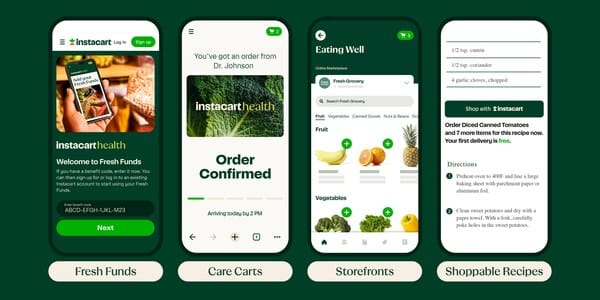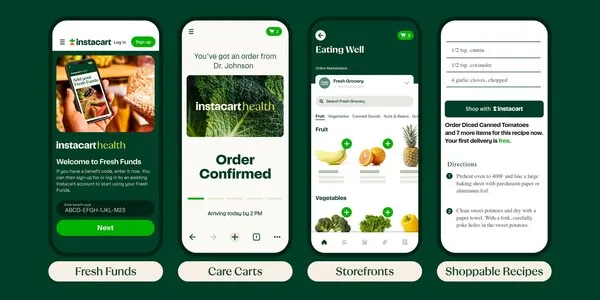SAN FRANCISCO — Instacart announced the availability of a suite of digital tools for providers across the country to enhance collaborative care, promote healthy choices, and deliver nutritious foods to patients and their families. The announcement is in collaboration with today’s White House event that continues the work started at the White House Conference on Hunger, Nutrition, and Health to help end hunger and reduce diet-related diseases by 2030.

Instacart Health
“We know that access to nutritious foods can deliver healthier outcomes, but a number of challenges have prevented healthcare providers from effectively adopting food as medicine programs at scale. With Instacart Health, we have the unique opportunity to partner with providers to expand proven nutrition programs and more deeply integrate food as medicine into standard patient care,” said Sarah Mastrorocco, Vice President and General Manager of Instacart Health. “We’re proud to offer these products to help providers expand access to nutritious food and make medically-tailored groceries and meal advice more actionable. Together, we can help patients and their families take an active role in their health through food.”
It is widely accepted that nutrition is critical to health but today over 30 million people in the U.S. live in food-insecure households – including as many as 9 million children1. Studies have shown that nearly 46% of adults and 56% of children in the U.S. have an overall poor-quality diet2, and unhealthy diets account for more than $50 billion in U.S. healthcare costs.
Providers understand the role nutritious diets can play in keeping people healthy, whether it’s ensuring a patient has access to day-to-day nutrients, helping a patient manage their diet-restrictive disease, or supporting a patient that needs to adhere to a strict diet to heal after surgery. Instacart Health tools make it easy for providers to prescribe food just as they would medications, establishing new programs including virtual food pharmacies and expanding access to nutrition. Instacart Health’s provider products today include:
- Fresh Funds – Providers can give patients Fresh Funds – customizable Instacart stipends – to enable patients to directly purchase nutritious foods on Instacart from their provider’s curated selection of recommended items, or specific ingredients for medically-tailored meal plans. With Fresh Funds, patients can select the foods that best fit their personal tastes and dietary needs and order directly from Instacart grocery retailers using their stipend. Patients can also use SNAP benefits or traditional funds to complete their weekly shopping trip online in one order. As part of this program, patients can consent to share their purchase history back to their provider. Today, Instacart is available to more than 95% of U.S. households, allowing providers nationwide to use this tool to increase patient access to nutritious foods and incentivize the adoption of healthier habits.
- Care Carts – Using Care Carts, providers can send custom grocery deliveries – based on a physician recommended diet – directly to patients in their care. This technology can also give providers tools to measure program effectiveness and identify where nutritious foods can make the greatest impacts in health.
These access products can be combined with additional provider tools designed to educate and inspire patients to make healthier choices, including:
- Virtual Storefronts – Now available across the country, Instacart’s custom Virtual Storefronts help providers educate and inspire their patients to make choices that will positively impact their health. Patients can visit their provider’s curated shop, browse specific foods recommended by their provider, and order them directly from their favorite local retailer for same-day delivery. Virtual Storefronts make it easier for patients to identify the best foods for their health and prioritize nutritious choices.
- Shoppable Recipes – Instacart’s recipes widget lets providers make their recommended healthy recipes shoppable, enabling patients and caregivers to add recipe ingredients directly to their Instacart grocery cart with the click of a button. Shoppable Recipes were built to help make healthy choices easier.
- Lists for Nutrition – With Lists, providers can easily build and share medically-tailored grocery lists with their patients, making a food as medicine plan immediately actionable and convenient for the patients in their care. Instead of leaving the appointment with a printout of a recommended diet, patients can shop from their provider-recommended foods through Instacart, and have those items delivered to their homes in as fast as an hour.
Boston Children’s Hospital is among the first health systems to leverage Instacart Health provider products for its patients, establishing new food as medicine programs to help them get the nourishment they need to manage and maintain their health.
“At Boston Children’s Hospital, we’re committed to pushing the boundaries of what’s possible in pediatric health and addressing our patient health needs holistically,” said Dr. John Brownstein, Chief Innovation Officer at Boston Children’s Hospital. “Together with Instacart Health, we are excited to explore this technology further to help our providers deliver programs serving patients and families with specific dietary needs. Food and nutrition programs are essential to disease treatment and prevention.”
Additionally, Instacart also today announced four new studies with leading academic institutions and health systems including Mount Sinai Hospital; the University of Kentucky; the University at Buffalo; and the Stanford Cancer Institute, Food for Health Equity Lab at Stanford Medicine, and the University of California, San Francisco’s Helen Diller Family Comprehensive Cancer Center to examine the impact of nutrition security interventions and food-as-medicine programs on different patient groups, including patients who live in low-income and food-insecure households.






